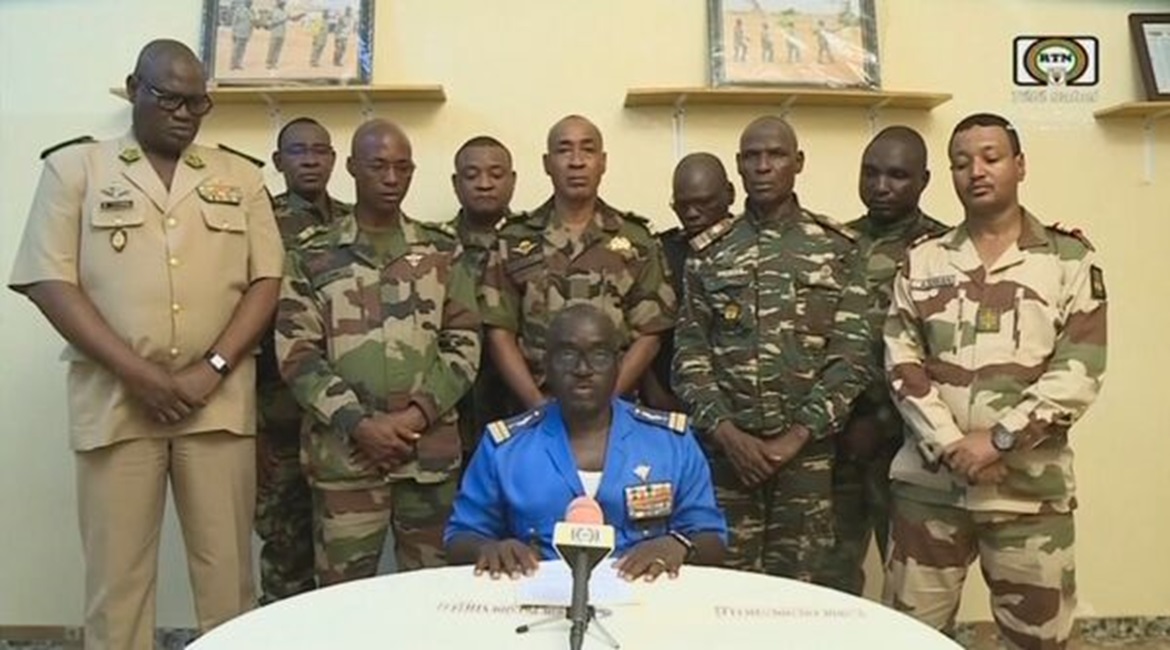
By Connor Davis
Key points
- Event: On 26 July 2023 a group of Nigerien military officers announced on state-owned television that they had overthrown Niger's democratically elected government
- Significance: The attempted ongoing coup is likely being resisted by what remains of the overthrown government and likely does not have the support of all of Niger's military
- Outlook: A successful coup would likely mean violence around the capital, Niamey, in the immediate term and likely create uncertainty in Niger's foreign relations and international commitments in the short term
Event
On 26 July 2023 at 2330 h local time, Nigerien military officer Colonel Major Amadou Abdramane announced on state-owned ORTN Télé Sahel television channel that the self-proclaimed National Council for the Safeguard of the Homeland (Conseil National pour la Sauvegarde de la Patrie: CNSP) had overthrown Niger's President Mohamed Bazoum and removed the democratically elected government. Col Maj Abdramane, spokesperson for the National CNSP, appeared surrounded by a military group in various Nigerien military uniforms and announced that the CNSP had suspended the constitution, closed Niger's air and land borders, and instated a curfew between 2300 h and 0500 h local time. Col Maj Abdramane cited “the continuing deterioration of the security situation [and] the bad economic and social governance” as the reasons behind the coup. No violence has been reported between members of the Presidential Guard (Garde Présidentielle) and the military or between military units.

Video frame grab image obtained by AFP from ORTN Télé Sahel showing CNSP spokesperson Colonel Major Amadou Abdramane (centre) speaking during a televised statement on 26 July 2023. (ORTN Télé Sahel/AFP via Getty)
Significance
On the morning of 26 July the Presidential Guard took control of the presidential palace and detained Bazoum and his family. In his 26 July televised statement, Col Maj Abdramane stated that the CNSP would respect the “physical and moral integrity of the authorities” in accordance with human rights principles. Members of the Presidential Guard then attempted to negotiate with Bazoum. Jeune Afrique, an international news outlet, quoted a military source as saying, “The ongoing negotiations are aimed at avoiding a confrontation between the members of the Presidential Guard involved and the rest of the army.” Later in the day, Radio France Internationale (RFI) reported that Nigerien military units took up positions at key locations in Niamey, including television and radio stations.
A 26 July statement posted on the official Twitter account of the Nigerien presidency stated, “The army and National Guard [of Niger] are ready to attack the elements of the PG [Presidential Guard] … if they do not return to a better disposition.” During the afternoon, a group of protesters attempted to approach the presidential palace demanding the release of Bazoum. However, they were turned away by members of the Presidential Guard, who fired warning shots. The opposition of military units to the Presidential Guard on 26 July and the presence of Niger Army and Air Force personnel during the televised announcement of the attempted coup indicate the likely factionalisation of the Nigerien armed forces.
Members of Bazoum's overthrown government have declared their intention to resist the CNSP. The former Minister of Foreign Affairs, Hassoumi Massaoudou, announced himself as the acting head of an interim government in a statement posted on his Twitter account on 26 July at 0448 h local time, saying, “I appeal to all democrats, to all patriots, to defeat this adventure”. Jeune Afrique quoted a government adviser saying that the balance of power between Bazoum's government and the CNSP on the morning of 27 July was “50–50”.
Niger has suffered four successful military coups since its independence in 1960. In every instance, the military returned the government to civilian control and maintained a consistent foreign policy, particularly in relation to France. The country has also witnessed a number of failed coups, the most recent occurring in 2021, days prior to the inauguration of Bazoum as president. Members of the Niger Air Force attempted to seize the presidential palace but were defeated in a firefight by the Presidential Guard. Officers affiliated with the attempt were jailed. In the CNSP's televised statement on 26 July, Col Maj Abdramane reaffirmed the council's commitment to “respecting all commitments entered into by Niger”.
The ongoing attempted coup threatens the large foreign presence in the country that is connected primarily to the French, the European Union (EU), and the US state and military capacity-building efforts as well as counter-insurgency (COIN) missions in Niger. This presence significantly increased in size following the 2020 and 2021 military coups in Mali, which caused the redeployment of European Union Training Mission (EUTM) personnel and French troops formerly deployed under Operation ‘Barkhane' to Niger. Amid political instability in neighbouring countries, Niger had become a hub for international COIN efforts in the Sahel region. Foreign presence in Niger is limited primarily to the capital Niamey, in which personnel are quartered in hotels and private accommodation in the city. Foreign military personnel and equipment are primarily situated at a large military base co-located at Niamey's largest airport, Diori Hamani International Airport.
Niger experiences significant insecurity resulting from persistent insurgency by Sunni and Salafi Islamist groups Wilayat Gharb Afriqiyya, an Islamic State-affiliated group, and Jama'at Nusrat al-Islam wal-Muslimin (JNIM). The threat posed by these non-state armed groups (NSAGs) in Niger has greatly reduced since 2021, demonstrated by a 146.66% decrease in the number of attacks and a 179.13% decrease in the resultant fatalities since 2021, as of May 2023.
Outlook
In the immediate term, violence is likely to increase around the capital city of Niamey owing to the defiance of the remaining members of Bazoum's overthrown government and to the factionalisation of the Nigerien military. As of 27 July Bazoum's former cabinet ministers have not expressed support to the CNSP, which is likely not supported by all of the Nigerien military at the outset of the coup. The lack of institutional support likely indicates that the CNSP is not yet in full control of Niger's institutions. Strong international opposition to the CNSP also indicates the likelihood that attempts to counter the coup will find support from Niger's regional partners, particularly in the Economic Community of West African States (ECOWAS), as well as from Niger's partners such as France and the US.
In the short term, it is likely that there will be significant uncertainty regarding the implications of the ongoing attempted coup for Niger's foreign policy and international co-operation initiatives. Although Niger has a strong history of foreign policy continuity and return to civilian government following military coups, similar coups in the Sahel region over the last three years have prompted the re-alignment of these countries away from Western partners towards alternative partners such as Russia. The CNSP has not indicated any change of foreign policy at the time of publication. However, the council identified the worsening insecurity and poor economic and social governance as the justification for the attempted coup. This rhetoric strongly echoes justifications given for military coups in Burkina Faso and Mali, both of which shifted foreign policy away from traditional Western partners.
(Note: Items from news/wire services are abstracted from the originals and are not verbatim)






